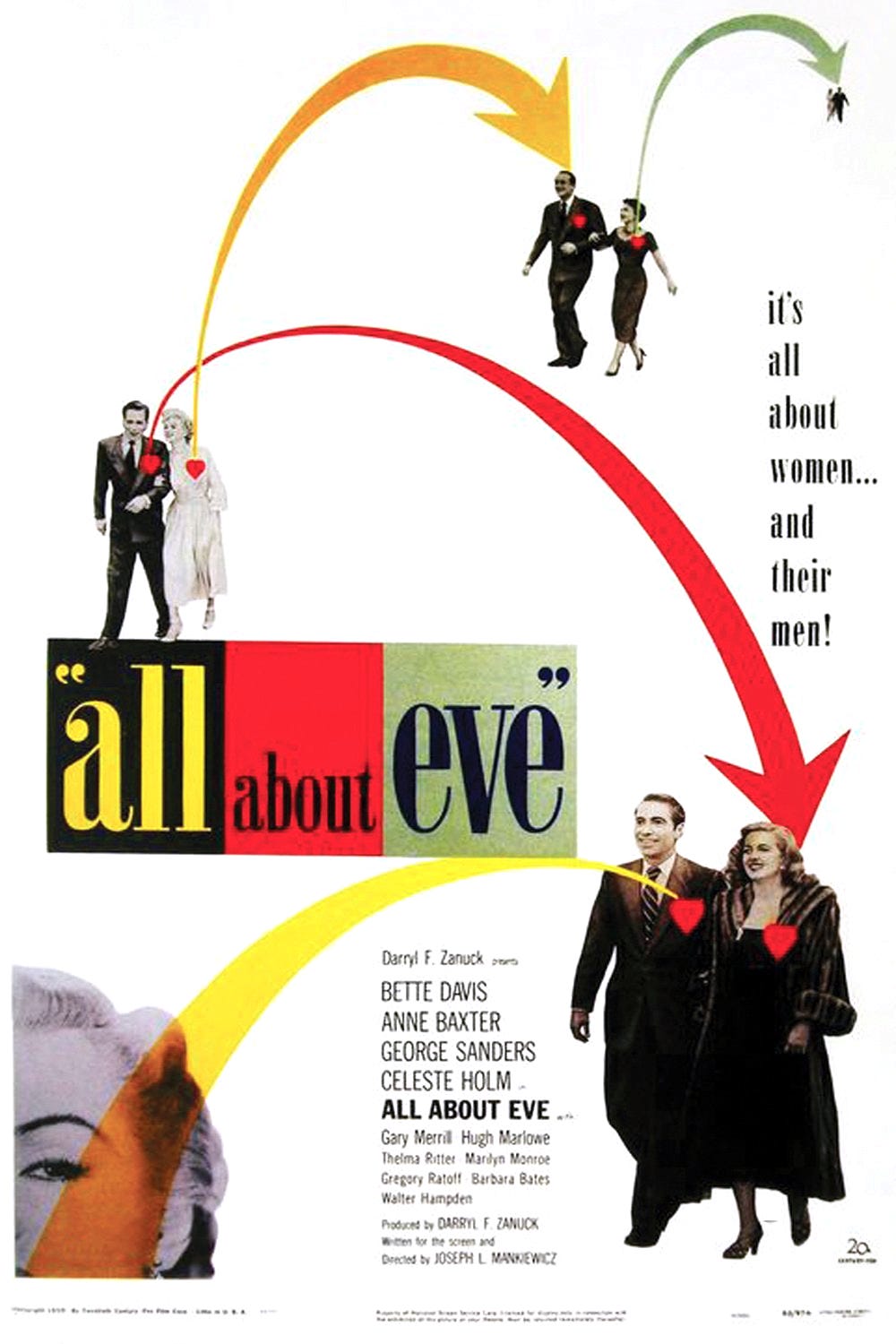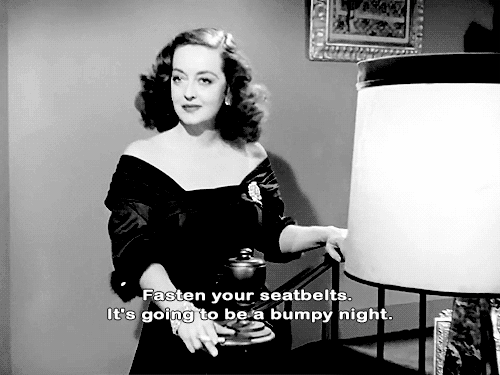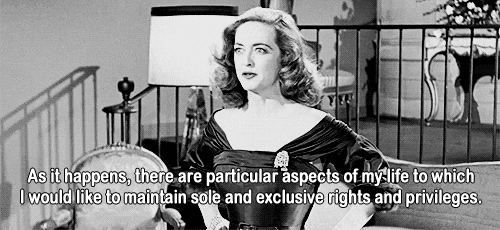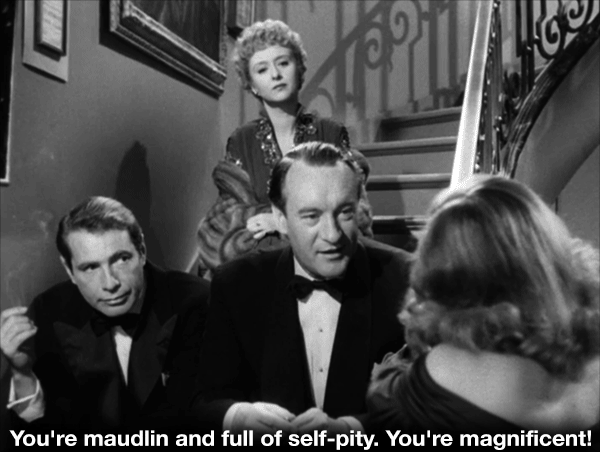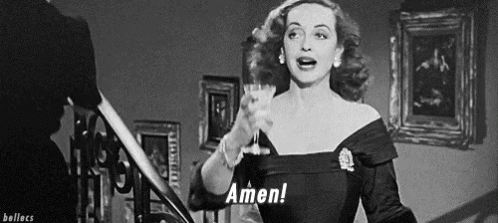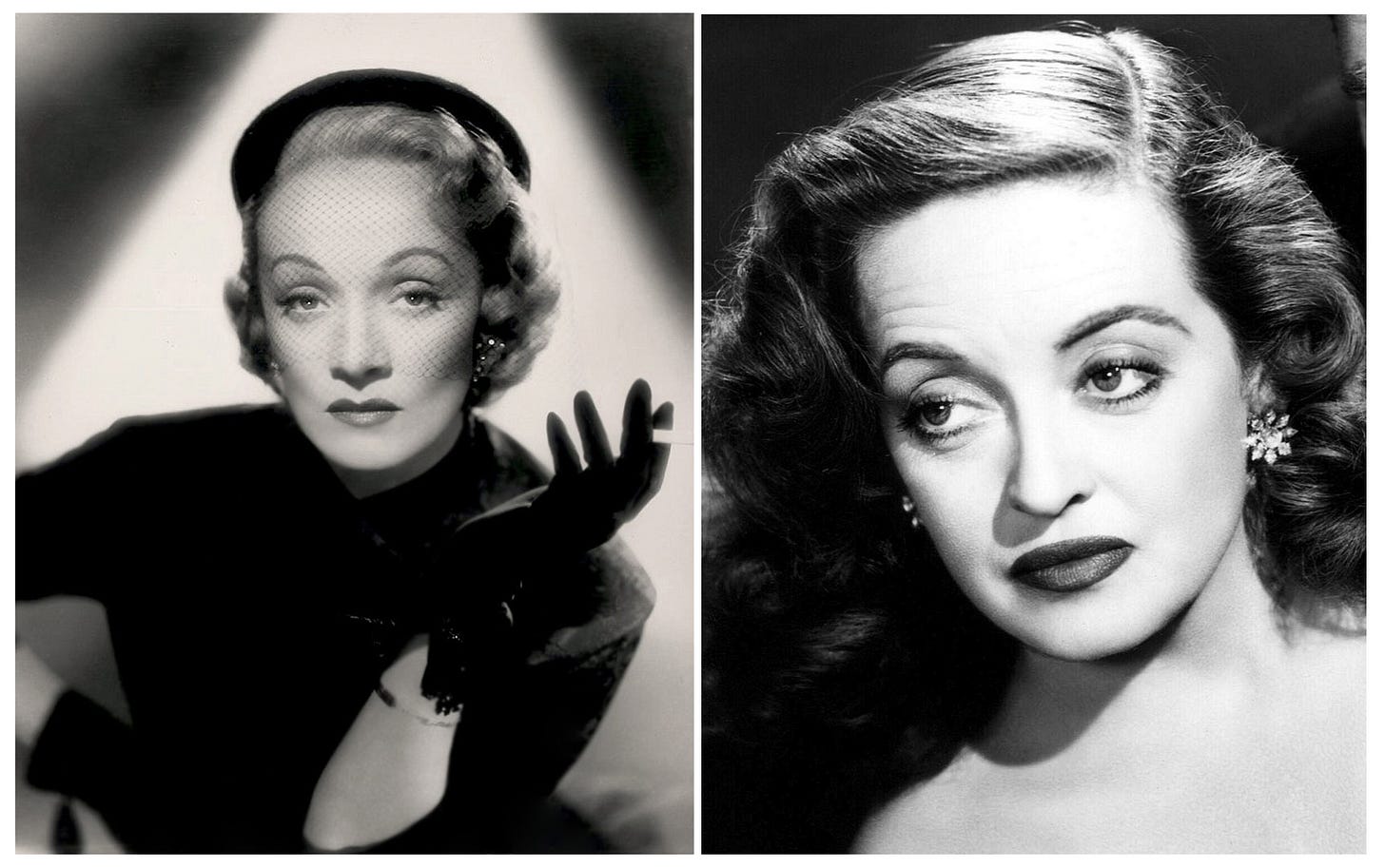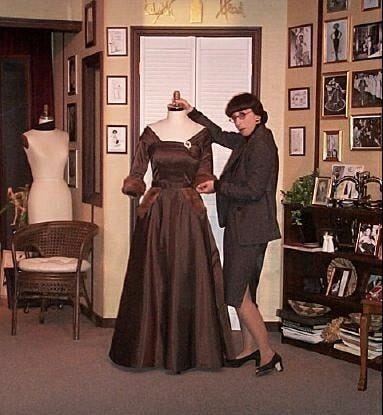Michelle
We begin at an awards ceremony. Before it’s even announced that Eve is being awarded the top gong, Margot (Bette Davis) has already sneered over her glass of freshly poured liquor and lit cigarette. The announcer waxes all but lyrical of the revered Eve. Eve, the golden girl.
Back we go. Eve isn’t famous yet, she’s bright-eyed and bushy-tailed. Eve is brought backstage to meet her idol Margot by Karen. Karen is Margot’s friend and the playwright’s wife. Eve has been to every one of Margot’s performances since becoming a “war widow”.
Margot is delicious and villainous. What is it about watching a silver screen legend lather their face in cold cream? Bring this trend back, I say.
They all become friends (aside from Margot’s companion, Birdie who remains an Eve sceptic). The score is light. We meet Bill, Margot’s lover and potential beard (I remain unconvinced Birdie is just a platonic companion).
Eve is a lamb, loose in a concrete jungle. The Lamb moves in with Margot. She is now on Margot’s payroll as her biggest supporter and infiltrator. The score becomes ominous. I’d like a martini, very dry.
Eve and her beard fight. We buckle up for the bumpy night.

A very green Marilyn Monroe arrives on the arm of the mud-slinging (and very sassy) critic, Mr DeWitt.
Producer Max’s name is on the box of bicarb in Margot’s pantry. While fetching it, she convinces Max to hire Eve. Little does she know Eve is already conspiring to take the place of her understudy. Eve brings Karen into her scheme and Karen gives Eve her blessing. Karen wouldn’t mind giving Margot a kick in the pants. Eve wonders aloud if Margot would approve?” Hahaha NOPE.
Margot is characteristically late for an audition. As Eve is her understudy, she reads Margot’s lines. Eve dazzles; she’s a born actress. Margot’s relationships unravel in a spate of rapid-fire dialogue. Margot wishes all playwrights were dead for 300 years. Lloyd, the playwright agrees, as the actresses that plague them never die.
Bill says his goodbyes. Goodbye, beard.
Friendships are tested. Bill doesn’t come away for the weekend, leaving only Mr and Mrs Playwright for Margot to play with. They run out of fuel, and Margot misses a show. She becomes self-aware and apologises for being appalling. She is vulnerable. Sexism and ageism march on. Karen, the architect of the breakdown that will give the understudy a shot on Margot’s stage, quietly gulps with regret.
Eve the understudy performs. Bill spurns her advances. Eve’s humility has holes poked through it by Mr DeWitt, who tells her to drop the pretence and toot her own trumpet. Her flimsy backstory is similarly skewered. What was the name of the theatre in San-Fran again, Eve? War widow, aren’t ya?
Mr DeWitt is effervescing with excitement. He becomes Eve’s ally.
Karen does a one-eighty. She says Eve would ask Abbott for Costello and bars Lloyd from ever casting her. Bill comes through. He toasts his engagement to Margot, and perhaps all she’d put in the fridge for her career isn’t in stasis after all.
In the ladies’ room, we see Karen over a barrel. Eve wants to play Cora, the part written for Margot, otherwise, she’ll expose Karen’s conspiring against Margot.
Me DeWitt raises his glass to acknowledge the party of four from his table.
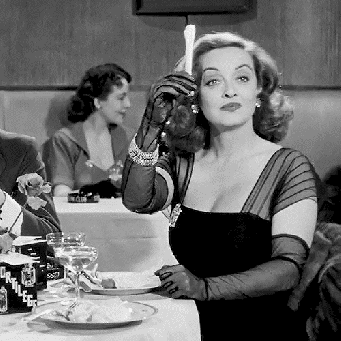
Margot refuses the gift of Texas from her groom in exchange for it to no longer be all about Eve. Despite this, Margot remains in the driver’s seat of a conversation that continues without straying from the topic of Eve. Margot doesn’t want to play Cora after all, and Karen laughs with relief as she prizes her body from Eve’s figurative barrel.
Eve rehearses Cora. Bill and Lloyd fight bitterly. Lloyd is summoned to comfort his new star, Eve, on her teary behest. Karen stews in the muck of Eve getting closer to her husband. Eve reveals to Mr DeWitt her sights are set on Lloyd, the most successful playwright in all of America.
Eve is a killer, but so is Mr DeWitt. He makes it clear he is not her fool, and he will not be taken for a ride. Eve belongs to him. He knows her secrets, her icky past and her actual name (Gertrude). Killer to killer, they have a shared contempt for humanity. Eve sobs. After all her careful plotting and scheming, this is not at all what she expected.1 She declares she cannot go on and is unable to perform to standard. Mr Dewitt instructs her to give the performance of her life.
“Eve gave the performance of her life.” says the voiceover.
Back to where we began, Eve accepts her award. Her acceptance speech sees the return of her false humility. She thanks Max (the only one who appears blind to her antics), Karen, Margot, Bill and Lloyd. They loathe her. They glare, they light cigarettes. They do all but acknowledge the accolades Eve bestows upon them in such a public format.
Eve skips the afterparty, to return to her apartment where discovers her very own Eve in her room. Take a bow, Phoebe (that’s what she is calling herself).
“And that’s what you call a picture,” Michael declares.
Michael
The only problem I see with the sublime All About Eve is the idea that anyone would rather watch Anne Baxter over Bette Davis. Because of this conceit, this very well may be my favourite Science Fiction film.
I love this movie; in it, writer/director, Joseph Mankiewicz and, producer, Darryl Zanuck, hit the zenith in their contentious relationship (Zenith here means the collective peak of their push/pull not the most vehement of their headbutts - that would be Cleopatra2). The two worked together many times and here they managed to make a snappily-paced, crowd-pleaser of a film without sacrificing a lick of depth… nor snark.
That being said I’m not truly sure what to write about the movie that hasn’t been mentioned above or before, thus this re-watch I also listened to the excellent commentary on the Criterion edition of the movie. Not the one featuring Celeste Holm and Joseph Mankiewicz’s son but rather the expertly presented commentary of Sam Staggs, author of All About ‘All About Eve’3. I recommend that you listen to this commentary (or, read his book, which probably has more factoids throughout) but in case you don’t have the time or opportunity I’m going to share some of the interesting points raised throughout.
First and foremost, by no means was Davis the first choice for the lead. Far from it in fact. Bette Davis, much like Margo Channing, was at a point in her career where it was getting more difficult to get roles with substance. Though a clear star, she had reached the age that, even now but especially then, Hollywood did not have great roles for. The studio went through a number of possible Channings but was very insistent on Marlene Dietrich (can you imagine? I wouldn’t complain). Claudette Colbert was also considered (another great choice). Though the idea that Davis was somewhat ‘over the hill’ added more heft to her performance which would have certainly resonated with the moviegoing public at the time.
Another notable change from conception to released film is the title, All About Eve was originally be called Best Performance. It’s no secret that Hollywood and the Academy love movies about the performing arts, so the title was somewhat a double play on the industry and Eve’s undermining, usurping tactics. And talking about awards, the Sarah Siddons Society Award (named for the famed Welsh actress), given during the bookends of the film was not a real award, neither was the society that shared its name. However, two years after the film was released the Chicago theatre society established the society and began issuing the award annually from then on. Bette Davis even won an honorary Sarah Siddon’s Award in 1973.
Another fascinating tidbit was that the man emceeing the awards ceremony once fired a very young Bette Davis from a stage production he was directing. Apparently, and surprisingly, he did not raise any ire from Davis on set and they laughed about the coincidence. Not everyone was spared from Davis’ vexations, Celeste Holm was on the backfoot instantly, apparently for being too polite. Davis was not spared from controversy either, the scene where she smokes in bed was subject to many complaints, though Zanuck refused to cut the scene it was labelled by the National Fire Protection Agency as ‘adult delinquency’. Zanuck himself got involved in some bickering, not so subtly hating the fresh-faced Marilyn Monroe (Zsa Zsa Gabor, then-wife of George Sanders was also not a fan).
The multiple freeze frames in the film may feel cliché now but at the time were quite a revolutionary idea. Hitchcock may have been the first user in his early film Champagne and, of course, who can forget George Bailey proclaiming that he ‘wants a big one’ frozen with his arms indicatively spread out in It’s a Wonderful Life, both earlier films. However, we’d say that All About Eve popularised the use in the context that it most commonly is recognised by modern audiences: the now somewhat hackneyed ‘you’re probably wondering how I got into this mess’.
Edith Head who designed the famous cocktail dress worn by Bette Davis in the film had a rude shock. Mere hours before filming was to begin she discovered that the dress did not fit Davis as intended. With no time for the extensive alterations necessary she panicked, Davis playfully pulled the shoulder straps (which were intended to be vertical) down below her shoulders. The slinky result made for an accidental icon and, in part, nabbed Head an Oscar for her work on the film.
Though I don’t recall it mentioned in Staggs’ commentary, it is notable that Gary Merrill, the actor playing Margot Channing’s boyfriend and director, Bill Sampson became the final Mr Bette Davis. Though both married at the time of meeting on set they fell in love and married each other, eventually divorcing in 1960. Notably, they adopted a girl named Margot.
A not so subtle interpretation that I must admit escaped me on previous viewings of this movie is all about the final shot. Eve, having won her award, met a somewhat familiarly mannered ingénue goes to rest. Phoebe, the expropriator, looks into the mirror thanking her many eternally recurring reflections whilst holding Eve’s award. Though they take on the form of admirers, Phoebe no doubt listening to their applause, they too are bowing. There are many other ‘Eves’ out there, waiting in the wings, ready to irrupt into the life of a fading star and seize their stardom.
The other surprise: Mr DeWitt’s interest in a woman.
This contemporaneous article describes Zanuck’s taking over of Cleopatra, the ill-fated project of the younger Mank. Including a few scathing comments from Billy Wilder. Be still my heart.
For continuity’s sake (between these footnotes), Stagg’s also wrote a book about Billy Wilder’s Sunset Boulevard another perfect movie also released in 1950 - What a year to be alive! He also wrote a book about Zsa Zsa Gabor, one-time wife to Addison DeWitt himself - George Sanders.





